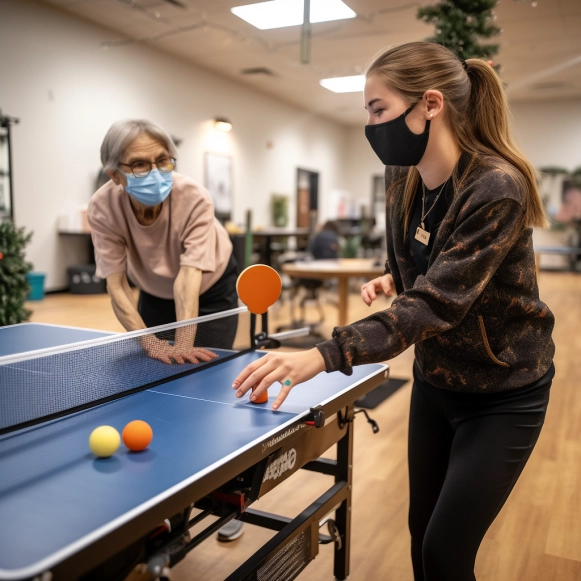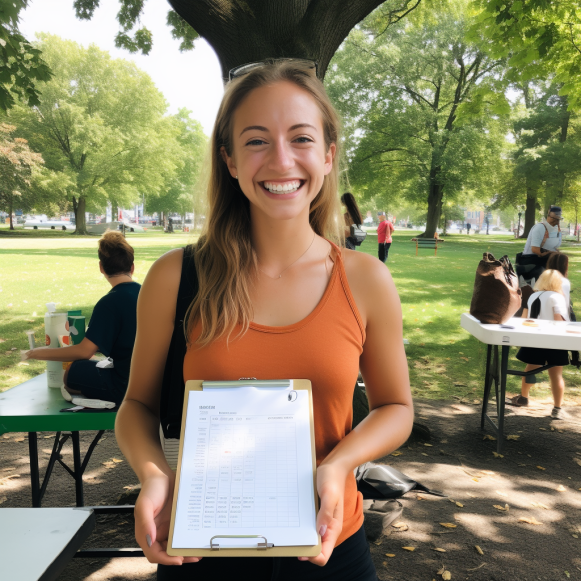Patients with neurodegenerative diseases turn to pingpong for rehabilitation. Scientists are paying attention.

NeuroPong program, led by founder and CEO Antonino Barbera, marries medicine with a love of table tennis
Mark Lauterbach was walking out of a brewery in Fort Collins earlier this year when he was pelted by hail. He took off running toward his car instinctively.
He burst into tears when he arrived.
“I felt like Forrest Gump,” Lauterbach reflected. “I ran, and all I could do was cry.” It’s been amazing.”
The 58-year-old thought his running days were over after being diagnosed with multiple sclerosis eight years ago. But pingpong, he claimed, had restored his gift for running.
Lauterbach attributes a significant improvement in his overall mobility to table tennis. Scientists are now investigating the link between neurodegenerative conditions and the game commonly associated with parents’ basements through the Colorado-based NeuroPong program in which he participates.
Lauterbach experienced neuropathy on the right side of his body following his diagnosis, making movement of his arm, hand, leg, and foot difficult. He developed balance issues and was unable to run or ride his bike around Fort Collins.
However, Lauterbach received an email from the Multiple Sclerosis Society about a pingpong group formed to help people with neurodegenerative diseases such as MS, Parkinson’s, and dementia about a year ago.
The NeuroPong program, founded and led by Antonio Barbera, combines medicine and a love of the game. Barbera brings his 31 years of medical experience, which was interrupted by an MS diagnosis in 2017, while Francesca Vargas, a 27-year-old Peruvian table tennis champion and fellow MS patient, brings her pingpong expertise as head coach.
Lauterbach began regaining his balance and learning proper pingpong technique after about three months of sessions inside a Fort Collins church gymnasium under the tutelage of Barbera and Vargas.
Researchers at the University of Colorado’s Anschutz Medical Campus’s Movement Disorders Center were so intrigued by the anecdotal success stories that they began studying the NeuroPong players’ symptoms and tracking their improvements for their research.
“Table tennis is not a miracle,” said Barbera. “The paddle isn’t a marvel. Your brain is what makes you magical.”
Bridging physical, mental and social health
Barbera, a gynecologist for over 30 years, was unable to work after his MS impaired control of his right arm and leg. He also felt tightness in his chest, which Barbera compared to an elephant sitting on his torso.
Barbera was playing pingpong with his son in his garage in 2019 when he noticed something.
“It was like the elephant was sitting in a chair on the other side of the room, leaving me alone,” he told me.
Barbera felt better after playing the tabletop game, but the former physician wanted science to back him up. He sought advice from neurologists, physical therapists, and scientists to learn more about how exercise and socialization can improve cognitive function and whether pingpong could be an effective form of rehabilitation for people suffering from neurodegenerative diseases.
He reasoned that table tennis’s motor function, quick decision-making, hand-eye coordination, and side-to-side movement could be a perfect storm for improving cognitive function.
Barbera established NeuroPong in 2021.
He now oversees the program, which has about 60 players split between sessions in Boulder and Fort Collins. Players have varying skill levels. Some people have difficulty walking and standing. Some people use a wheelchair. Others have tremors or little control over their limbs, according to Barbera. Many people have never used a paddle before.
Players range in age from teenagers to people in their 90s, and they all have neurodegenerative conditions that affect their nervous systems.
When a new member joins the crew, Barbera evaluates them to determine where they should start. Some players cling to the pingpong table and practice walking back and forth across it or tossing and catching the ball in the air. Barbera and Vargas keep a close eye on the players’ balance and movement control.
Vargas teaches basic table tennis techniques such as serving and hitting. She works with the players, throwing the ball in such a way that it sets them up for success.
However, a successful volley is not the ultimate goal.
“What I care about most is the entire person,” Barbera said.
Barbera and the researchers are also interested in how the players are feeling emotionally and socially.
Lauterbach says the group has given him a community of people who understand what he’s going through — friends who can meet for coffee after sessions.
Lauterbach beaming in the Fort Collins church gymnasium earlier this month as he demonstrated his ability to balance on one leg — something he once couldn’t do — surrounded by his newfound friends.
“There is fellowship, and that helps, too,” Lauterbach said. “I work my whole schedule around pingpong because I hate missing it.”
Research is promising
Vargas also goes out of his way to attend NeuroPong.
To get to her head coaching job, the 27-year-old bikes to a bus stop in her Highlands Ranch neighborhood, takes the bus to Fort Collins, and then bikes to the church that serves as the group’s home base before returning home.
When the Peruvian professional pingpong player was diagnosed with multiple sclerosis two years ago, she thought her table tennis career was over. Dizziness, balance issues, and vision issues plagued her, but the athletic young woman refused to let the diagnosis define her.
Instead, six months after her diagnosis, Vargas returned to the court with her pingpong paddle and won another Peruvian table tennis championship.
“Something inside said I could do it,” Vargas explained.
Soon after, Vargas went to Denver to visit friends and ended up meeting Barbera.
The pingpong champion had kept her diagnosis private, only telling close friends and family, because the medical condition had put her in a bad mood, she explained.
Vargas couldn’t say no when Barbera offered her a job and the opportunity to be open about her journey.
“Maybe this is my destiny, to help people that are doing the same as me and going through the same as me,” she went on to say.
Vargas was greeted with smiling hugs from her trainees during a recent NeuroPong practice, who praised her friendliness and dedication. Vargas volleyed the ball back and forth while Barbera came around correcting posture, recommending stretches, and assessing how everyone was doing.
“I can see that this program is improving people’s symptoms,” he said. “People are becoming more resilient. People who could not stand on their own before are now able to do so. People are more in control of their movements. They say they can now open jars that they couldn’t before. It has a significant impact on quality of life.”
So far, science is in agreement.
According to Matthew Woodward, a fellow at CU Anschutz’s Movement Disorders Center, the results of their current studies — which look at outcomes such as balance improvement, movement, and mood — show no negative results. To be statistically significant, the findings must be tested on a larger population, according to Woodward, but the research — this first study focuses solely on Parkinson’s disease — appears promising.
Additional research is being conducted, according to Barbera.
According to Woodward, the only thing doctors and scientists have discovered to slow the progression of Parkinson’s is exercise. He suggests 30 minutes of vigorous exercise four to five times per week.
Table tennis is unique in that it combines several brain-stimulating challenges, such as hand-eye coordination, balance, motor functions, and speed, while also being lower-impact and more manageable than other sports, according to Woodward.
After a November practice with his friends, Mark Kelley, 73, helped pack up the pingpong tables in the Fort Collins church.
He claims that the program is much more than pingpong. His life has been transformed by physical therapy and friendship.
“When I’m playing, it’s like my Parkinson’s melts away,” Kelley told me.





